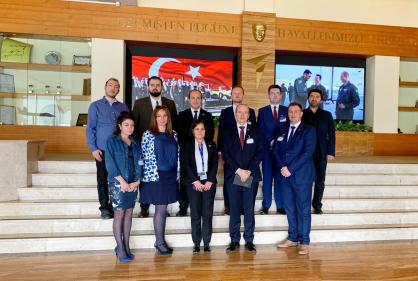Yunus Emre Institute and ILOT Sign Cooperation Protocol
The Aviation Institute of Warsaw (ILOT), which has agreed to cooperate under the Academic and Scientific Cooperation Project of Turkey (TABİP), conducted by Yunus Emre Institute under the auspices of the Presidency of the Turkish Republic paid a working visit to Ankara between April 25 and 27. The ILOT team has participated in the visit at the highest level, and visited the central campus in Kahramankazan of the Turkish Aerospace Industries (TAI), which offers cooperation within the scope of the TABİP, on April 26. During the talks, the TAI and the ILOT made presentations on their organizational structure and projects. Then, meetings of technical nature were held between the relevant departments of the TAI and the ILOT to discuss the opportunities for mutual cooperation. The TAI delegation showed interest in the ILOT's materials section, rotary wing systems, and wind tunnel capabilities and indicated that they may benefit from the ILOT's supersonic tunnel service. The TAI delegation also noted that they would like to pay a visit to Warsaw campus of the ILOT at the shortest time possible to make on the spot examinations. During the visit, the ILOT's delegation toured around the central campus of the TAI.
Yunus Emre Institute and ILOT sign cooperation protocol under the TABİP
Following the visit to the TAI, the ILOT delegation paid a visit to the headquarters of Yunus Emre Institute where they met Yunus Emre Institute President Prof. Dr. Şeref Ateş. During the meeting, the venues for cooperation under the TABİP were discussed and short presentation about the TABİP was made to the ILOT delegation. Following the talks, Yunus Emre Institute and the ILOT signed a cooperation protocol under the TABİP.
ILOT Director Dr. Pawel Stezycki expressed his satisfaction for the activities carried out so far under the TABİP while Institute President Prof. Dr. Şeref Ateş stressed the importance of the science diplomacy efforts in the development of value-added projects and the sustainability of bilateral relations.




